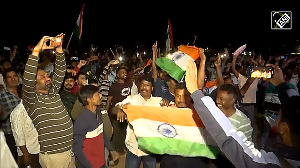A Salman Rushdie-Padma Lakshmi-Mira Nair billing guaranteed the success of the premiere of The Namesake as the opening event of Aroon Shivdasani's sixth Indo-American Arts Council film festival in Manhattan on November 1.
The event was Indian American to the core, with its celebrities thronging the hall and delaying the performance by chatting away much beyond the social hour.
What sets The Namesake apart from the other Indian nostalgia-cum-rebellion movies is the sensitivity with which the writer Jhumpa Lahiri and the director Mira Nair have treated the story.
Tabu, apparently Mira's third choice for the lead role, lifted Ashima, the Bengali bride, who had more than her share of stress and trauma, to the level of a heroine of legendary proportions. The serenity and calm on her face even at the height of emotional drama, speak volumes of her innate strength, which initially prompts her to accept the challenge of a life abroad.
When she is told at the traditional 'bride viewing' about the loneliness of housewives abroad, her response is that, after all, 'he' will be with her and she hardly knew him! She faces adversity stoically and has a life as a singer beyond the dissolution of her family and her husband's death. Her grief is dignified and her acting restrained.
Irrfan Khan as Ashoke Ganguly is the perfect Bengali intellectual, to whom books gave the joy of travel without moving an inch. Nikolai Gogol, the mystic writer from the Ukraine inspired him more than the Bengali masters to the extent that he gives his son the name Gogol, which has a Bengali ring about it.
It is a copy of Gogol's Overcoat that changes his life in more ways than one, but he does not even try to persuade his son not to change his name into Nikhil, an uncanny adaptation of Nikolai. He is an extraordinary liberal father when it comes to his children and there is hardly any clash between father and son on account of their cultural identities.
He clings to his values and culture, but does not resent the customs of others, even a peck on the cheek by his son's girlfriend. He accepts the transition with dignity and even trains his wife for a life without him by moving to another city for a while.
Even the way he faces death, without protesting against his having to wait in line for medical attention makes him an embodiment of pathos. He may be a bit unreal in the context of desi culture in the US, but not exaggerated or artificial. His Bengali pride and sense of history stand out in the film.
Kal Penn is an unusual Indian name, but as Gogol, he is the epitome of the second-generation desi in America. He is tethered to the rock of an Indian upbringing, but he pulls it as far as he can to be part of the culture that he has to live in. He is extremely loyal to his parents, but sees no contradiction in having a family of his own by virtue of a relationship with a white girl. He quickly accepts his mother's suggestion to marry an Indian, but ironically finds that his Indian wife is disloyal.
Gogol's relationship with his mother and father is portrayed in a subtle manner and he becomes the true hero of the movie when he handles his varied roles with equal devotion.
Others in the film, except Jacinda Barrett, Gogol's American girlfriend, are just part of the wide canvas that Mira Nair uses to tell her story. None of them commands individual attention. But all of them merge into the scenery and accentuate different aspects of desi life in America. The slice of desi life that the film presents is authentic.
Jhumpa Lahiri was not at the premiere, but it is her genius that permeates the film. Mira Nair did justice to the novel by her casting, her sympathy for the theme, which, she said, was her own story in a way, and her superb sense of timing. The opening scene in an Indian train and the accident that follows bring in the change in the Ganguly family with a bang.
The film is likely to lose a couple of its explicit sex scenes when it opens in India. But the scenes are integral to the movie and the first scene of Ashoke and Ashima in bed with all their clothes on contrasts with the prompt shedding of clothes by Gogol's Indian girlfriend. Migration, it is clear, changes even the way people make love.
Indian Americans love to delve deep into their own lives and they lap up all the desi literature and movies about themselves. But they are very discriminating in their taste. The Bombay Dreams musical, which did well in London, flopped in New York because of the exacting standards of the Indians in New York.
Many tearjerker tales of desi nostalgia have disappeared without a trace. But The Namesake is sure to be received well when it is commercially released early next year. The celebrity audience on November 1 has already passed the verdict: "Excellent!"
Rediff Rating:
T P Sreenivasan, who recently retired from the Indian Foreign Service, was India's ambassador to the United Nations, Vienna, and governor for India, International Atomic Energy Agency, Vienna.






 © 2025
© 2025